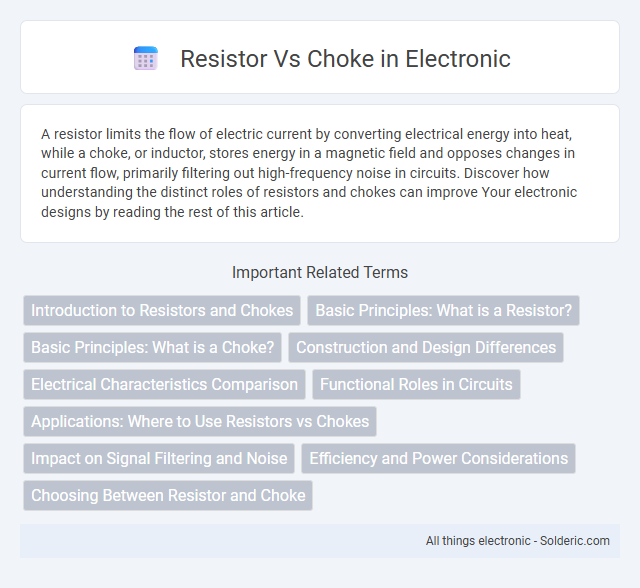A resistor limits the flow of electric current by converting electrical energy into heat, while a choke, or inductor, stores energy in a magnetic field and opposes changes in current flow, primarily filtering out high-frequency noise in circuits. Discover how understanding the distinct roles of resistors and chokes can improve Your electronic designs by reading the rest of this article.
Comparison Table
| Feature | Resistor | Choke |
|---|---|---|
| Function | Limits electric current and dissipates energy as heat | Blocks or filters high-frequency AC signals, allowing DC or low-frequency current |
| Component Type | Passive electronic component with resistance (ohms, O) | Passive inductor with inductance (henrys, H) |
| Symbol | Resistor symbol (zigzag line) | Inductor symbol (coiled line) |
| Energy Storage | No energy storage, converts electrical energy to heat | Stores energy in magnetic field temporarily |
| Frequency Response | Frequency-independent, constant resistance | Frequency-dependent impedance; blocks high frequencies |
| Applications | Current limiting, voltage division, biasing circuits | Noise filtering, signal smoothing, EMI suppression |
| Material | Carbon film, metal film, wirewound | Coil of wire around a magnetic core or air core |
| Power Dissipation | Converts electrical energy to heat; limited power ratings | Minimal power loss; mainly reactive component |
Introduction to Resistors and Chokes
Resistors regulate electrical current by providing precise resistance, measured in ohms, crucial for controlling voltage and protecting circuits. Chokes, or inductors, store energy in a magnetic field and impede high-frequency signals while allowing low-frequency or DC currents to pass, measured in henrys. Understanding the distinct functions of resistors and chokes helps optimize your electronic design for signal filtering and current management.
Basic Principles: What is a Resistor?
A resistor is an electrical component that restricts the flow of electric current by providing a specific amount of resistance, measured in ohms (O). It dissipates electrical energy as heat and is used to control voltage and current levels within a circuit. Unlike a choke, which stores energy in a magnetic field, a resistor purely converts electrical energy into thermal energy, making it essential for managing current flow in your electronic devices.
Basic Principles: What is a Choke?
A choke is an inductor designed to block high-frequency alternating currents while allowing direct current to pass through easily. It operates based on the principle of inductive reactance, which increases with frequency, making it effective for filtering noise in electronic circuits. Unlike a resistor that dissipates energy as heat, a choke stores energy in its magnetic field, ensuring your circuit maintains signal integrity without significant power loss.
Construction and Design Differences
Resistors are constructed using materials such as carbon film, metal film, or wire wound around a ceramic core to provide a precise and stable resistance value, while chokes consist of coils of insulated wire wound around a magnetic core designed to impede high-frequency AC signals. The resistor's design emphasizes controlling current flow by dissipating electrical energy as heat, whereas the choke's construction leverages inductance to block or filter alternating currents while allowing direct current to pass. These fundamental differences in materials and coil structures reflect their distinct roles in electronic circuits for resistance and inductive reactance, respectively.
Electrical Characteristics Comparison
Resistors provide a fixed electrical resistance, measured in ohms, that dissipates energy as heat and limits current flow in a circuit. Chokes, or inductors, offer inductive reactance dependent on frequency, storing energy in a magnetic field and opposing changes in current without significant power loss. The key difference lies in resistors having a constant resistance regardless of frequency, whereas chokes exhibit impedance that increases with frequency, making them essential for filtering and noise suppression applications.
Functional Roles in Circuits
Resistors primarily control current flow and voltage levels by providing a precise amount of resistance, enabling voltage division, current limiting, and signal attenuation in circuits. Chokes, or inductors, serve to block or filter high-frequency signals while allowing direct current or low-frequency signals to pass, making them essential in power supply filtering and electromagnetic interference suppression. Both components play distinct yet complementary roles in managing circuit performance and signal integrity.
Applications: Where to Use Resistors vs Chokes
Resistors regulate current flow and divide voltage in electronic circuits, making them essential for applications like voltage drop, current limiting, and signal conditioning. Chokes, or inductors, are used to block high-frequency AC signals while allowing DC or low-frequency signals to pass, ideal for filters, power supplies, and noise suppression in RF circuits. You should choose resistors for precise current control and chokes when managing electromagnetic interference or smoothing current in power systems.
Impact on Signal Filtering and Noise
Resistors provide linear resistance that attenuates signal amplitude uniformly without frequency selectivity, offering limited noise suppression in filtering applications. Chokes, or inductors, present frequency-dependent impedance that blocks high-frequency noise while allowing desired low-frequency signals to pass, enhancing signal integrity in filtering circuits. The inductive reactance of a choke increases with frequency, making it highly effective in reducing electromagnetic interference (EMI) and radio frequency interference (RFI) compared to resistors.
Efficiency and Power Considerations
Resistors dissipate electrical energy as heat, resulting in power loss and reduced efficiency in circuits, especially under high current conditions. Chokes, or inductors, store energy in a magnetic field and release it without significant power dissipation, making them more efficient for filtering and energy storage applications. The choice between resistors and chokes depends on the desired balance between energy loss and circuit performance, with chokes generally offering superior power efficiency in AC and transient suppression scenarios.
Choosing Between Resistor and Choke
Choosing between a resistor and a choke depends on your circuit's need for controlling current versus filtering noise or managing reactive power. Resistors provide consistent resistance to limit current flow and dissipate energy as heat, making them ideal for voltage regulation and current control. Chokes, or inductors, store energy in a magnetic field and are essential in applications requiring noise suppression, signal smoothing, or reactive power management in AC circuits.
resistor vs choke Infographic

 solderic.com
solderic.com